Classic Characteristics of Umm al-Mu’minīn Aisha al-Ṣiddīqah (r.a.)
Aisha bint Abu Bakar (r.a.), the third and youngest wife of the Prophet Muhamad ﷺ, comes on the top of the list amongst the other Ummahat al-Mu'mineen, in terms of spreading the messages and teachings of Islam after the Prophet ﷺ for more or less 44 years.[1] Setting an exemplary model for female teachers, she was hailed for her knowledge on spiritual as well as political grounds. In fact, she has been considered one of the greatest scholars in Islam who conveyed more than 2200 hadith of the Prophet ﷺ and secured 4th position in terms of narrating the Prophetic tradition after Abu Hurayrah (r.a.) Abdullah bin Umar (r.a.) and Anas bin Malik (r.a.) The mere fact that would suffice to signify her status among the other wives of the Prophet ﷺ is that the Prophet ﷺ spent his last moment with her and his tomb was prepared in her room itself.
There are many more such things that we need to know about Aisha bint Abu Bakar (r.a.) and with that, we would be able to get the actual standpoint of Islam regarding the unbiased approaches towards males and females. This article will shed light on some of the 4 attributes from the life of Aisha bint Abu Bakar (r.a.) that she was adorned with and try to unearth how important her involvement was in the growth and development of Islam during the formative stage of it.
1- An Exemplary Scholar
Aisha (r.a.) being the youngest wife of the Prophet ﷺ was blessed to have a huge opportunity to spread the teachings of the Prophet ﷺ after his demise. She mostly narrated the actions and demeanors of the Prophet ﷺ inside the house and helped people know how the Prophet ﷺ actually slept, dealt with wives, his prayers routine, his thought process, and many more such delicate topics. [2]
Because of her intelligence and mastery over the jurisprudence and amazing experience with the Prophet ﷺ, the companions of the Prophet ﷺ used to come to her to get a better understanding of the intricacies of the rulings and she wholeheartedly used to participate as much as she could. She has narrated around 2210 hadith of the Prophet Muhamad ﷺ which includes the matters of the inheritance, medications, poetry, history and many others. Because of this caliber and companionship of the Prophet ﷺ, she has been considered as one of the greatest scholars in Islamic history.
This also breaks the shackles of allegations that have been raised against Islam that it is the religion of patriotic values and misogynistic approaches. It is from the basic tenets of Islam that it encouraged the Muslims for the acquisition of knowledge irrespective of gender and what we see today of scholars’ negative stance on female education is a bit of precautious approach that women should not get involved in any sort of trouble due to amalgamation of inter-gender education. In some cases, what we see of local or familial culture and custom have nothing to do with Islam and it doesn't represent Islamic law in its true sense. To understand Islam better, we need to get back to Islamic principles and values rather than evaluating it with the culture and the tradition of what Muslims practice.
2- Aisha (r.a.)’s Patience against the Allegations
During one of the expeditions with the Prophet Muhamad ﷺ, Aisha (r.a.) was left behind by the caravan. When Safwan bin Mu'attal, who was on another journey, saw her and helped her to get back to the caravan, the hypocrites started making allegations of Zina (adultery) against her. This misinformation was hyped in such a manner, that even the believers fell prey to this propaganda and started believing it. With her return, Aisha (r.a.) fell ill and she was later on informed that something fishy was going on behind her. In fact, this event changed the behavior of the Prophet ﷺ with her too but he kept silent waiting for signs from Allah the Almighty. One day Aisha (r.a.) asked for the Prophet's ﷺ permission and went to her parent’s home. One day, when the Prophet ﷺ visited her and asked her to repent if she had sinned, she started crying and appealed to Allah to show her chastity as others were losing their belief in her.[3]
Therein, when Allah saw how helpless she was feeling regarding her innocence and there was nothing else to help her out except Quranic revelation, He sent his archangel Gabriel with the revelation, and the Prophet Muhamad ﷺ within a matter of minutes became sweat which indicated he recently received revelation.[4] After the revelation, the Prophet ﷺ gave the good news to Aisha (r.a.) and with this, she felt a sigh of relief against all the rumors that have been so far spread to tarnish her and the Prophet's ﷺ image in front of the Muslims by the disbelievers. These verses are in chapter 24 of Surah Nūr from verses 11-20. Allah revealed verses of the Quran about her and showed her status among the other Muslims. In these mostly distressing times, she kept with her patience and faith in Allah, which resulted in the revelation and became an evidence in favour for her forever.
3- The Mutual Love between Prophet ﷺ and Aisha (r.a.)
There are a number of narrations about the love and compassion of the Prophet ﷺ for Aisha (r.a.) and vice versa that show how considerate the Prophet ﷺ was about her wives with special consideration to Aisha (r.a.). Aisha (r.a.) used to enjoy the times when she found the Prophet ﷺ beside her and the Prophet ﷺ used to enjoy the meals when she sat next to him in the meals. The Prophet ﷺ used to place his lips where Aisha (r.a.) had placed her lips and eat from the bone of meat with his mouth where Aisha (r.a.) had placed her mouth. In fact, the Prophet ﷺ used to put morsels of food into her mouth and she would do the same with him to show love and compassion in return.[5]
In other hadiths, it can be found that the Prophet ﷺ used to use code languages with each other denoting their love. When, Amr bin Aas, one of the companions of the Prophet ﷺ asked him “who is the most beloved to your heart?” he answered straight away “Aisha”.[6] This behavior of the Prophet ﷺ and Aisha (r.a.) is an exemplary model for the modern generation to learn how important it is to be romantic to the partner and always strive to keep the spouse happy as much as possible. But one thing that has to be paid extensive attention to is that it is not the responsibility of any certain partner to take care and show love and compassion, rather both the wife and husband would have to know their priorities and act accordingly. Love needs to be expressed.
4- The Prophet Muhamad's ﷺ last moments were with Aisha (r.a.)
The Prophet ﷺ had spent his last moments in this world with Aisha (R.A.). When the Prophet Muhamad ﷺ felt that he would no longer be in this mortal world, he requested to stay with Aisha (r.a.). During these days, Aisha (r.a.) used to pay special attention to his affairs. When the Prophet ﷺ asked for miswak, she chewed the end of the miswak so that the Prophet ﷺ would get the bristles soft and it would help him clean his teeth. Similarly, the moment when the soul of the Prophet ﷺ was taken, he was in the lap of Aisha (r.a.), and from therein he left this mortal world. Narrating this incident, Aisha (r.a.) herself has mentioned: “It was one of the favors of Allah towards me that Allah’s Messenger ﷺ departed this world in my house…while he was leaning against my chest and Allah made my saliva mix with his saliva at his death” (Bukhari).
Conclusion
To summarize, Aisha (r.a.) is one of the exemplary personalities in Islamic history who have taught us how to be obedient and love-exchange partners as well as stick-to-value people even when the entire world stands against us. The best fact about her life is that she was an exemplary scholar which shows that Islam has never been a misogynist religion and nor does it marginalize women in any area. It is because of her that we are aware of many of the inside house behavior and rituals of the Prophet ﷺ today. May Allah bless us to follow in her footsteps and be in Jannāh with her: Ameen.
Endnotes:
[1] Geissinger, Aisha (January 2011). "'A'isha bint Abi Bakr and her Contributions to the Formation of the Islamic Tradition". Religion Compass. 5 (1): 37–49.
[2] Anwar, Jawed (4 April 2005). “History Shows the importance of Women in Muslim Life”. Muslims Weekly.
[3] B. Soumaya. (26 November 2015) “The Slander against Ayesha (RA) (Mother of the Believers) and her Vindication by Allah”.
[4] Chapter 24, Surah Nūr from verse 11-20.
[5] Aly Hatem (15 October 2019) “Moments of Romantic Love Between Prophet Muhammad & Aisha”. About Islam.
[6] ( Sahih Bukhari: 3662 )
About the author: Sirajuddin Shaikh is a PG research scholar at Darul Huda Islamic University, Kerala, India. His research areas include Islamic Studies, the Study of human behavior, and Islamic Psychology.)
Disclaimer
The views expressed in this article are the author’s own and do not necessarily mirror Islamonweb’s editorial stance.

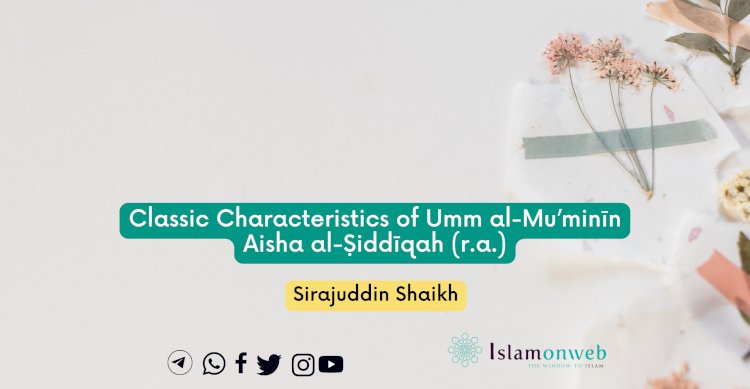



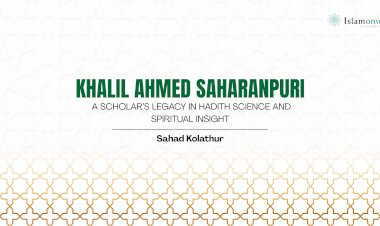
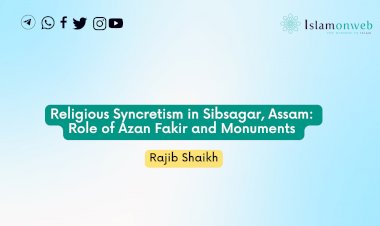
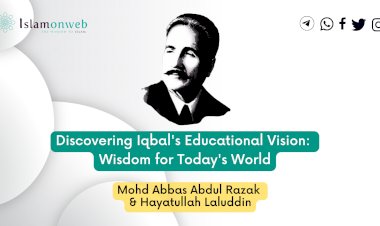

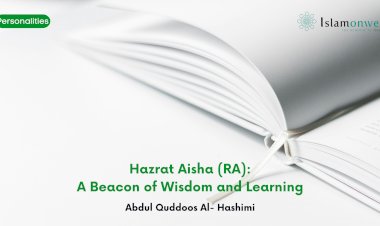














Leave A Comment